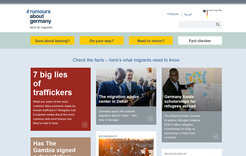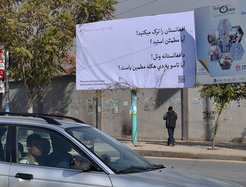Advertizing against Asylum
Thoughts on the “Rumours about Germany” Campaign
This is a translation of the blog article ![]() Werben gegen Asyl. Gedanken zur ‘Rumours about Germany’-Kampagne” by Nerges Azizi und Dana Schmalz from 08.01.2018. Translated by Christiane Kofri.
Werben gegen Asyl. Gedanken zur ‘Rumours about Germany’-Kampagne” by Nerges Azizi und Dana Schmalz from 08.01.2018. Translated by Christiane Kofri.
On January 23, 2018, in reaction to the original version of this blog article, the Federal Foreign Office corrected the two points that were referred to in the section “Legally correct?”. The authors welcome these changes.
Under the title of “Rumours about Germany ”, the Federal Foreign Office informs about the possibilities of being granted protection in Germany. In English, French and Arabic, “reliable facts” are provided in short texts practically sorted into three categories: “Sure about leaving?”, “On your way?”, “Need to return?”. The summary information offered is largely formulated through questions that appear in boxes, underwritten with “true or false”, and answers that appear after a click. This format, offering the possibility of guessing, is not devoid of a certain cynicism. Asylum seekers can, for example, click on the question box “Will you be rescued after two hours in a rubber boat?”. The answer provided by the Foreign Office: “No. This is what smugglers promise, but: Rescue missions may not be where your boat is. Even if they were, your chances of being picked-up in time are extremely small – especially if smugglers leave your rubber boat drifting without a motor. The journey remains very dangerous and continues to cost thousands of lives”.

Legally correct?
Many of the questions refer to vague assessments: Will your life in Germany be easy? – No . Will border patrols find you? – Yes. Will you get by with your English in Germany? – No . The underlying message is clear: it will be very difficult for those seeking protection. In this vein, the information campaign spares no simplifications. Such simplification is problematic when it leads to the question-answer pairs themselves become misleading. “Will you be returned by force if you come illegally?”![]() [i] – Yes, is the answer provided. This is legally incorrect. Illegal entry is not a reason for forced return; according to the principle of non-penalization contained in Art. 31 para. 1 Refugee Convention , it also should not lead to any penalties. In the explanation of the answer, the rejection of the of the asylum application is stated as the reason for potential deportation, but the original answer to the question remains misleading. Equally false or misleading is the explanation that follows the question of whether your nationality will determine your right to asylum. No , is the answer provided, only people who have suffered persecution or serious harm are entitled.[ii] This is incorrect. It is a well-founded fear of being persecuted or a real risk of suffering serious harm that is relevant rather than past events. Again here, a reference to the Refugee Convention and German asylum law is contained in the longer explanation, but the brief answer is simply inaccurate.
[i] – Yes, is the answer provided. This is legally incorrect. Illegal entry is not a reason for forced return; according to the principle of non-penalization contained in Art. 31 para. 1 Refugee Convention , it also should not lead to any penalties. In the explanation of the answer, the rejection of the of the asylum application is stated as the reason for potential deportation, but the original answer to the question remains misleading. Equally false or misleading is the explanation that follows the question of whether your nationality will determine your right to asylum. No , is the answer provided, only people who have suffered persecution or serious harm are entitled.[ii] This is incorrect. It is a well-founded fear of being persecuted or a real risk of suffering serious harm that is relevant rather than past events. Again here, a reference to the Refugee Convention and German asylum law is contained in the longer explanation, but the brief answer is simply inaccurate.
One may find these indications to be petty. After all, the campaign is not about delivering detailed knowledge of German asylum law, right? But what is it actually about? According to the self-description of the website, its purpose is “to ensure that current migrants (…) do not have to rely on false information and rumours spread by people smugglers”. The goal of the website is to inform, not to discourage. “The decision to embark on the dangerous journey to Europe is such an important one that it should be based on facts, not rumors.” But then, accurate information about the recognized grounds for asylum and the impunity of irregular entry are also crucial. A balanced information would clarify not only the risks and potential hindrances faced by migrants and asylum seekers, but also their rights. The latter side is practically missing in the Federal Foreign Offices’ information campaign.
Campaigning against Germany – already in Afghanistan
The website “Rumours about Germany ” has only existed for several months, but the campaign dates back somewhat further. The German Embassy in Kabul has been running it since 2015, the respective online banners can be found on their website in English, Dari and Pashtu versions. This campaigning against Germany does not, however, occur only online. Large-scale posters can be found on busses and billboards in the streets as well as video clips on TV and social media platforms like Twitter and Facebook. Behind this stands the narrative that it is not worth it to leave towards Germany. According to the Federal Foreign Office , the campaign is directed against the intentional misinformation by human traffickers. The campaign was also initiated 2015 in Pakistan and in several West and North African countries, although not to the same extent as in Afghanistan (you can find information on the different information measures taken in different countries here ). The content of the campaign statements in Afghanistan largely corresponds to the above-mentioned of the website, with a few specific aspects. One of the banners , for example, reads: “By fleeing your home country, you will be putting you and your family in danger”. This is an astonishing statement. It is the assumption of international refugee law, that people flee because they have good reason to already believe themselves to be in danger. It is part of the most dreadful aspects of flight, when the families of those who have fled thereby face additional dangers. To frame this as the irresponsibleness of the migrant is not a clarification, it is a distortion.

© picture alliance /dpa
The narrative of responsibility towards the home country can also be found extensively in another campaign – the website ‘Afghanistan Needs You’. This is a private initiative that lobbies for staying in Afghanistan and against emigration. A documentary trailer informs about the disappointments and harsh living conditions encountered by Afghan refugees in Europe. The slogan “Afghanistan needs you” is spread through various communication channels – on social media, an SMS campaign, and street graffiti. It is worth taking a closer look at this campaign – not so much to speculate on its support by any official body or to question the message as such, but to understand the risks that such a narrative can entail. It entails the risks of referencing a responsibility for one’s own country in order to downplay rights under international or European Law. International Law includes the right to leave any country, including one’s own. European Law includes the guarantees of the European Convention on Human Rights (ECHR) that obliges contracting states to grant protection to persons who would face inhuman or degrading treatment upon expulsion. European Union Law, moreover includes the right to an individual asylum procedure. The right to leave and seek protection elsewhere is not constrained by Afghanistan’s interest to keep its citizens in the country. More importantly, even, it is not constrained by Germany’s interest to, in return for military and civil assistance, no longer receive asylum seekers from Afghanistan. Yet, this is precisely the link, that the German Minister of the Interior, Thomas de Maizière, repeatedly emphasizes: it cannot be that people are fleeing from Afghanistan after Germany has invested so much in its security and reconstruction. One could expect Afghans to remain in their country.
The acceptance rate of Afghan asylum seekers shows that this cannot be expected. Even after the decision-making practice became more repressive in 2016, around 45% of asylum seekers from Afghanistan received protection in 2017. This means that almost half of the persons targeted by the dissuasion efforts are actually recognized by the law as having a valid claim to protection. In light of this, de Maizière’s statement seems to mirror the view that a legally irreproachable right to protection in Germany still constitutes an expendable luxury. The same applies to large parts of the “Rumours about Germany” campaign and the ever greater incentives offered for voluntary departure even before completion of the asylum procedure (For more on this in German see here).
Asylum claims as an expendable luxury?
The conception of a legal claim to protection being an expendable luxury links to a further motive that pervades the website : local development aid instead of protection in Germany. References are made to aid projects in Somalia and Sudan, to targeted support of refugees in the Middle East and to a “returning stability” in Iraq. Is more assistance in regions of origin really the vision of the future? It was the slogan of the past decades, and funds for assistance were especially generous when the threat of onwards migration to Europe grew; assistance offered to “stem the exodus”. Yet, already now, refugees are concentrated in a few states in the Global South, usually in close proximity to their countries of origin. The topic of responsibility sharing stands at the core of the negotiations for a Global Compact on Refugees , and the following call to the wealthy states of the Global North to receive more, instead of fewer persons. Of course, this is not the task of Germany alone; of course, the number of refugees received in 2015 and 2016 was high. But before leaning back and setting up websites that ultimately do not aim at informing but at deterring, one should consider at whose expense this fight is being fought. It is being fought at the expense of the many, that are to be dissuaded from realizing the rights accorded to them by the Geneva Refugee Convention.
________________________
[i] The question has now been rephrased to ask “Will you be returned by force if your asylum application has been rejected?”.
[ii] The explanation has been amended as follows: “Only people who have suffered or are likely to suffer persecution or serious harm are entitled to protection”.













